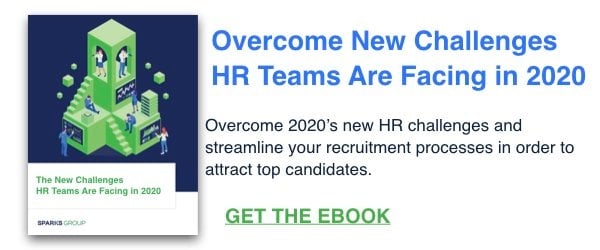
Hiring for leadership roles can be a time-consuming and challenging process for organizations, as these positions are vitally important to the long-term business success and growth.
To overcome recruiting obstacles, HR departments should consider partnering with executive search firms, whose primary purpose is to find and match exceptional leaders with quality organizations.
A recruiting agency can optimize the search for leadership positions including CEOs, C-suite execs, VPs, and the heads of business units. These leaders develop high-level strategies, outline an organization’s policies, and oversee its operations. The stakes are exceptionally high, and it’s imperative to maintain open lines of communication with your search firm to ensure success.
Related Reading: When Budgets are Shrinking, Cost to Hire is Critical
To best leverage a staffing agency for executive recruitment needs, HR departments should focus on these five things:
1. Identify Past and Current Leadership Challenges
Before working with an executive recruitment firm, your organization should analyze its workforce and management challenges and identify leadership needs and how a firm can best help. Especially during uncertain times, like with the COVID-19 pandemic, it’s more important than ever to find strong leaders with the quick thinking and analytical skills to determine how to best promote productivity and workplace success.
Search committees should prepare for the first contact with an executive recruiting firm bringing past examples of good and bad leadership at your team. This will help to describe in detail what has worked or hasn’t with previous leaders at your organization. Armed with this information, the executive recruiting firm will be able to better determine the types of skill sets and personalities to look for when searching for executive candidates.
2. What Experience Do You Have Working With Other Clients In My Industry?
Only your organization can determine what you need in a candidate. Unfortunately, defining and articulating your needs may not be as simple as it seems. When it comes to executive search, you should be looking for candidates with the experience and skillsets needed to solve critical business needs.
The HR department may not have all of the answers and therefore, must involve the organization’s key stakeholders to ensure that everyone is on the same page about your talent acquisition strategy; what are your priorities, timeline, non-negotiables, and nice-to-haves? Do a deep dive and analysis into what qualifications and personality types will best fit within the culture and needs of the position.
Related reading: 5 Questions to Ask When Selecting an Executive Recruiting Firm
3. Define the Role Clearly
Your search committee needs to be able to communicate to the search firm what the position entails. Executive recruiting firms often have access to passive candidates who already have a job and have many years of specialized experience. These types of candidates will typically ask tough questions about the role, as well as the organization, its culture, growth, and plans for the future.
In order to entice top talent, the executive recruiting firm will need to explain what the job will look like, both short-term and long-term.
4. Define Where Your Company Wants To Grow
When surveying prospective companies to work at, executive professionals will be paying close attention to any pages detailing past achievements and future goals. With this in mind, HR departments should work with the current leadership team to identify where the organization wants to expand in the coming weeks, months, and years to be able to tell the executive recruiting firm what information to convey to top candidates.
For this step, the more specific the better. Provide answers to questions relevant to leading a growing team such as: How do you see your company expanding in the next 5 years? What team size or structure do you anticipate in the next year? Is your organization planning to add new office locations in other cities or states? These responses will be important details to mention to prospective executive candidates.
5. Partner With an Executive Recruiting Firm
Executives are usually highly paid and require extensive management experience. Executive recruiting for these positions requires a partnership with a firm with due diligence and understands the nuances of your organization. These high-value executives also require a longer time to hire than most roles and can benefit from the proactive hiring strategies of and executive recruiting firm.
Related Reading: Four Benefits of Executive Recruiting for C-Level Hiring
Think of the executive recruiting firm as an extension of your brand. Don’t be afraid to share what you may consider “insider information” with the firm, as these details may be necessary to land the right candidate and answer their tough questions about the opportunity. To get the desired result, communication between the two entities must be seamless.
By using these three strategies, HR departments can leverage assistance from executive search firms to find the individual most uniquely qualified for the job. You’ll also want to qualify the firm you are going to work with before sharing any confidential information.
Select a firm with exceptional staffing and recruiting services, tenure and expertise in your industry and the specific job function you are hiring for. Also, pay close attention to their level of interest in learning about your organization, as this can be indicative of how successful the result will be.
Sparks Group specializes in executive recruiting for the many diverse industries we work with. With Sparks Group managing your staffing and recruiting processes, you can:
- Reduce the time and financial burden of internal hiring processes,
- Decrease employee turnover, and
- Increase focus on core objectives and business success.
Looking to hire executive talent or overcome other hiring challenges? Contact Sparks Group. We consistently deliver high-quality leadership candidates and customized solutions that include traditional staffing and recruiting, direct placement, and payroll services.







.png)